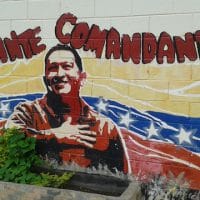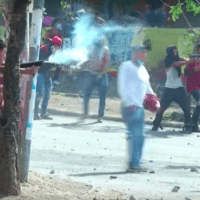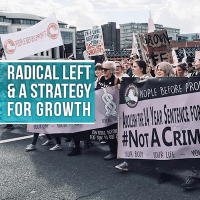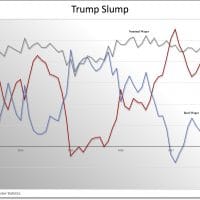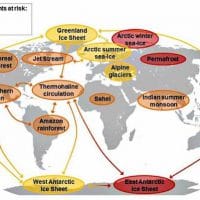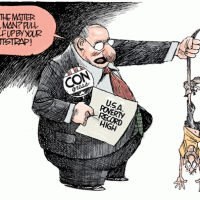-
Interview with Angel Prado (Part II): “The commune holds the solution to the crisis”
The continuation of a comunero leader’s reflections on the future of the communal project and the contradictions in the Bolivarian Process, in this interview with VA’s Ricardo Vaz.
-
U.S. military presence in Latin America & the Caribbean
The United States has some 800 military bases around the world, with 76 in Latin America and the Caribbean to protect its hegemonic interests in the region.
-
It is imperative to reconstruct the Internationale of workers and peoples
For the last thirty years the world system has undergone an extreme centralization of power in all its dimensions, local and international, economic and military, social and cultural.
-
From Boston to Ferguson to Charlottesville: the evolution of a Police State lockdown
It has become way too easy to lockdown this nation.
-
Interview with Angel Prado (Part I): “The commune holds the solution to the crisis”
A grassroots Chavista leader reflects on the future of the communal project and the contradictions in the Bolivarian Process, in this interview with VA’s Ricardo Vaz.
-
What’s Left in Nicaragua after Ortega
Before the violence that started mid-April, Nicaragua had been the most peaceful, safest, and by far the most progressive country in Central America. Now that a semblance of peace has been restored in Nicaragua, the U.S. government continues its campaign for regime change joined by some who formerly supported Nicaraguan President Daniel Ortega and his Sandinista party.
-
The radical left & a strategy for growth
The present social order is showing remarkable signs of decay. Slowing economic dynamism and growing geopolitical rivalries have produced a dangerous and chaotic world.
-
How Nicaragua’s ‘left-wing’ opposition MRS are NGO opportunists lobbying the West for regime change
The Sandinista Renovation Movement (Movimiento Renovador Sandinista – MRS) is the intellectual, left-sounding arm of reactionary politics in Nicaragua. Its popular base is minuscule, but it has been adept at courting Western support.
-
Capitalism vs. water
Capitalism vs. water.
-
The optimism of a victor
Finding a formula to describe Fidel is no easy task.
-
Black workers and immigrants: borrow a page from Marx
Tom Broadwater, a brother, recently wrote a commentary titled “Democrats’ Immigration Dogma is Damaging African American Communities.” It appeared in the Afro American newspaper and in Newsweek.
-
Don’t class warfare me
Marketplace’s Kai Ryssdal is no class warrior.
-
Climate change in the Anthropocene: an unstoppable drive to Hothouse Earth?
Leading Earth System scientists warn: “The Earth System may be approaching a planetary threshold that could lock in a continuing rapid pathway toward much hotter conditions.… Incremental linear changes to the present socioeconomic system are not enough to stabilize the Earth System.”
-
Death of a Marxist
Amin’s thesis—in economics—was written while he was active in the French Communist Party. In the thesis, he thought hard about the problems of his native land and other countries despoiled by the colonial menace. For Amin, as with other dependency theorists, the Third World suffered from theft, plunder as well as deindustrialisation, and then unequal exchange.
-
In memoriam: Samir Amin
Samir Amin, the renowned Marxist thinker and economist, passed away on August 13 in Paris. Born in Cairo on September 3, 1931, to an Egyptian father and a French mother, he had his initial education in Egypt before moving to Paris where he obtained his doctorate in Political Economy.
-
Stand up with new hope?
If you regretted (or rejoiced) that the left-wing German scene, rarely mentioned by US media, was an unimportant sideshow, be prepared for a surprising new hope, called Aufstehen: Stand Up—or for its opposite, more fear.
-
Samir Amin stood for people
Samir Amin transcends all borders capital creates to divide peoples struggling against exploiters, against all divisive politics, against all sectarian ideologies, which serve imperialism. Samir Amin stands for a modern life for peoples while opposes all backward ideas and ideologies serving exploiters.
-
Magical bootstraps and the struggles of working Americans
A recession is coming, sooner or later. Once it hits, we can expect articles bemoaning the fact that working people didn’t build-up their savings during this record expansion to help them through the hard times. If only they had pinched pennies here and there, skipped a new TV or smart phone, they could have generated some capital that could have been invested…. Ah the missed opportunities.
-
Venezuela’s monetary revolution vis-à-vis economic sanctions
Nino Pagliccia looks at the impacts of the increasing sanctions against Caracas.
-
Science fiction and the angel of history
A review of, ‘Sorry to Bother You’.

